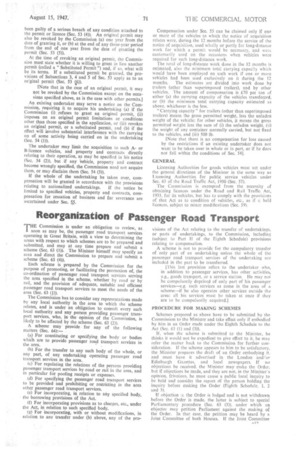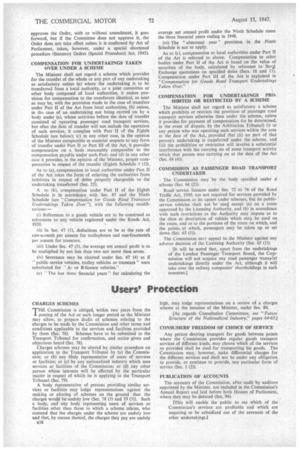Reorganization of Passenger Road Transport
Page 47

Page 48

If you've noticed an error in this article please click here to report it so we can fix it.
THE Commission is under an obligation to review, as soon as may be, the passenger road transport services operating in Great Britain, with a view to determining the areas with respect to which schemes are to be prepared and submitted, and may at any time prepare and submit a scheme (Sec. 63 (1)). The Minister himself may specify an area and direct the Commission to prepare and submit a scheme (Sec. 63 (4)).
Each scheme is prepared by the Commission for the purpose of promoting, or facilitating the promotion of, the co-ordination of passenger road transport services serving the area specified in the scheme, whether by road or by rail, and the provision of adequate, suitable and efficient passenger road transport services to meet the needs of the area (Sec. 63(1)).
The Commission has to consider any representations made by any local authority in the area to which the scheme relates, and is under an obligation to consult every such local authority and any person providing passenger transport services, who, in the opinion of the Commission, is likely to be affected by the scheme (Sec. 63(2)). A scheme may provide for any of the following matters (Sec. 64):— (a) For constituting or specifying the body or bodies which are to provide passenger road transport services in the area.
(b) For the transfer to any such body of the whole, or any part, of any undertaking operating passenger road transport services in the area.
(c) For regulating the relations of the persons providing passenger transport services by .road or rail in the area, and in particular for pooling receipts or expenses.
(d) For specifying the passenger road transport services to be provided and prohibiting or restricting in the area other passenger road transport services.
(e) For incorporating, in relation to any specified body, the borrowing provisions of the Act.
(f) For incorporating provisions as to charges, etc., under the Act, in relation to such specified body.
(g) For incorporating, with or without modifications, in relation to any transfer under (b) above, any of the pro
visions of the Act relating to the transfer of undertakings, or parts of undertakings, to the Commission, including (subject to Part 11 of the Eighth Schedule) provisions relating to compensation. A scheme is not to provide for the compulsory transfer of only part of an undertaking unless the whole of the passenger road transport services of the undertaking are included in the part to be transferred. [This last provision refers to the undertaker who, in addition to passenger services, has other activities, e.g., goods transport, or a service station. He may not be compulsorily deprived of only part of his passenger services—e.g. such services as come in the area of a scheme—if he also operates other services outside the area: all his services must be taken at once if they are to be compulsorily acquired.] PROCEDURE FOR MAKING SCHEMES
Schemes prepared as above have to be submitted by the Commission to the Minister and take effect only if embodied by him in an Order made under the Eighth Schedule to the Act (Sec. 63(1) and (3)).
If, when the scheme is submitted to the Minister, he thinks it would not he expedient to give effect to it, he may refer the matter back to the Commission for further consideration. If the scheme appears to him to be satisfactory, the Minister prepares the draft of an Order embodying it, and must have it advertised in the London and/or Edinburgh Gazettes, and local newspapers. If no objections be received, the Minister may make the Order, but if objections be made, and they are not, in the Minister's opinion, frivolous, he must cause a public local inquiry to be held and consider the report c5f the person holding the inquiry before making the Order (Eighth Schedule, 1, 2 and 3).
If objection tc the Order is lodged and is not withdrawn before the Order is made, the latter is subject to special Parliamentary procedure (Sec, 63 (3)), under which an objector may petition Parliament against the making of the Order. In that case, the petition may be heard by a Joint Committee of both Houses. If the Joint Committee
approves the Order, with or without amendment, it goes forward, but if the Committee does not approve it, the Order does not take effect unless it is confirmed by Act of Parliament, taken, however, under a special shortened procedure (Statutory Orders (Special Procedure) Act, 1945).
COMPENSATION FOR UNDERTAKINGS TAKEN OVER UNDER A SCHEME The Minister shall not regard a scheme which provides for the transfer of the whole or any part of any undertaking as satisfactory unless (a) where the undertaking is to be transferred from a local authority, or a joint committee or other body composed of local authorities, it makes provision for compensation to the transferors identical, as near as may be, with the provision made in the case of transfers under Part II of the Act from local authorities, (b) unless, in the case of an undertaking not being carried on by a body under (a), whose activities before the date of transfer consisted of operating passenger road transport services, but after the date of transfer will not include the operation of such services, it complies with Part II of the Eighth Schedule (see below); (c) in any other case, in the opinion of the Minister comparable in material respects to any form of transfer under Part II or Part III of the Act, it provides compensation on a basis reasonably comparable to the compensation payable under such Part; and (d) in any other case it provides, in the opinion of the Minister, proper compensation in respect of the transfer (Eighth Schedule 1 (I)).
As to (a), compensation to local authorities under Part H of the Act takes the form of relieving the authorities from liabilities in respect of debts properly chargeable to the undertaking transferred (Sec. 25).
A • to (b), compensation under Part II of the Eighth Schedule is in accordance with Sec. 47 and the Ninth Schedule (see "Compensation for GOods Road Transport Undertakings Taken Over"), with the following modifica ions:—
Ii) References to a goods vehicle are to be construed as references to any vehicle registered under the Roads Act, 1920, In Sec. 47 (1), deductions arc to be at the rate of one-scventh per annum for trolleybuses and one-fourteenth per aanum for tramcars.
(iii) Under Sec. 47 (3), the average net annual profit is to be multiplied by not less than two nor more than seven.
(iv) Severance may be claimed under Sec. 47 (4)as if " public service vehicles, trolley vehicles or tramcars" were substituted for " Aor B-licence vehicles."
(v) " The last three financial years" for calculating the average net annual profit under the Ninth Schedule mean the three financial years ending in 1948.
(vi) The "abnormal year provision in the Ninth Schedule is not to apply.
As to (c), compensation to local authorities under Part 11 of the Act is referred to above. Compensation to other bodies under Part II of the Act is based on the value of securities of the body, calculated by reference to Storik. Exchange quotations on specified dates (Secs. 16 and 17). Compensation under Part III of the Act is explained in "Compensation for Goods Road Transport Undertakings Taken Over."
COMPENSATION FOR UNDERTAKINGS PROHIBITED OR RESTRICTED BY A SCHEME The Minister shall not regard as satisfactory a scheme which prohibits or restricts the provision of passenger road transport services otherwise than under the scheme, unless it provides for payment of compensation (to be determined, in the event of dispute, by the Arbitration Tribunal) (i) io any person who was operating such services within the area at the date of the Act, provided that (ii) no part of that person's undertaking is transferred under the scheme, and (iii) the prohibition or restriction will involve a substantial interference with the carrying on of some transport activity which that person was carrying on at the date of the Act (Sec, 64 (4)).
COMMISSION AS PASSENGER ROAD TRANSPORT UNDERTAKER The Commission may be the body specified under scheme (Sec. 64 (2)). .
Road service licences under Sec. 72 to 76 of the Road Traffic Act, 1930, are not required for services provided by the Commission or its agents under schemes, but its publicservice vehicles shalt not be useel except (a) on a route approved by the Licensing Authority, and (b) in accordance with such restrictions as the Authority may impose as to the class or description of vehicle which may be used on the route, and as to the portions of the route on which, and the points, at which, passengers may be taken up or set down (Sec. 65 (1)).
The Commission may appeal to_the Minister against any adverse decision of the Licensing Authority (Sec. 65 (1)).
[It will be noted that, apart from the undertakings of the London Passenger Transport Board, the Commission will not acquire any road passenger transa:•;rt undertakings directly under the Act, although it will take over the railway companies' shareholdings in such concerns.]




















































































